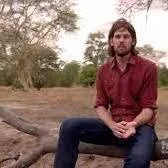ERICA BERRY - Author of Wolfish: Wolf, Self, and the Stories We Tell About Fear
/Author of Wolfish: Wolf, Self, and the Stories We Tell About Fear
And I think the ways that wolves converse with one another, there's also so much there that really conjures the way that we humans do. And I was trying to piece together: why did we feel so threatened by wolves? In part, I think because there's a sort of uncanny mirror that humans have seen in a wolf. And I'll give an example. Wolf packs will form a diversity of family structures very often. So they will have a nuclear family where you'll have two breeders, but they can also have an extended family where there's sort of aunts and uncles in the pack. Or (these are the biologist's names) they'll call it a step-family if a wolf pack welcomes an outside breeder. A foster family, if they welcome another outsider. And I think the way that a pack is its own ecosystem: if one wolf dies, there's one wolf in this pack that might be the one that teaches how to move through the territory. And if that one wolf dies, the whole pack has a much higher likelihood of disbanding. And so this idea that the interconnectivity between the packs and the individuality of the wolves is so critical. It is so beautiful, and you see that studying these different wolves, they have personalities.

